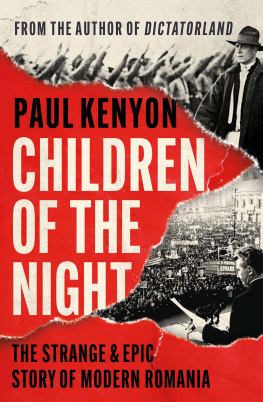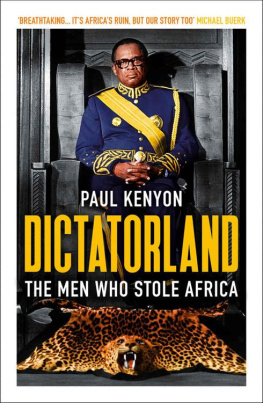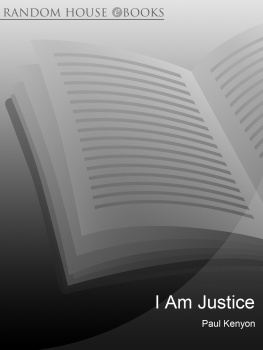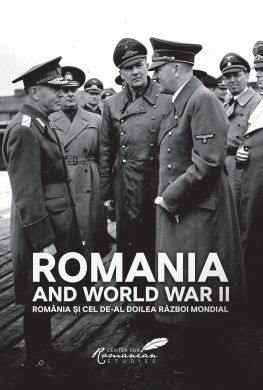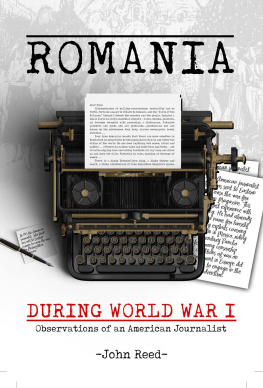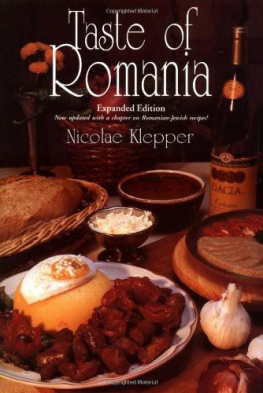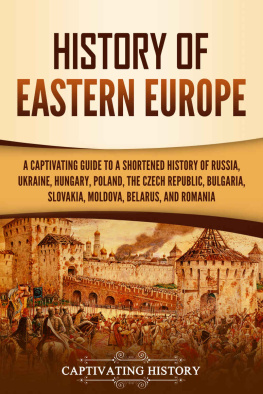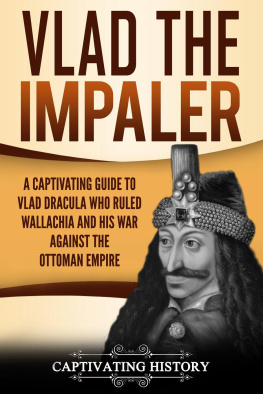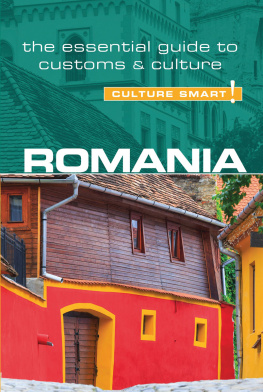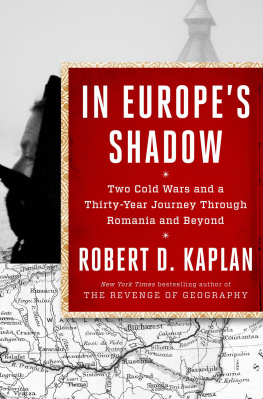The moral right of Paul Kenyon to be identified as the author of this work has been asserted in accordance with the Copyright, Designs and Patents Act of 1988.
All rights reserved. No part of this publication may be reproduced, stored in a retrieval system, or transmitted in any form or by any means, electronic, mechanical, photocopying, recording, or otherwise, without the prior permission of both the copyright owner and the above publisher of this book.
A catalogue record for this book is available from the British Library.
There Was Earth by Paul Celan. Originally published as Es war Erde in ihnen in Die Niemandsrose . S. Fischer Verlage GmbH, Frankfurt am Main. Translated into English by Sarah Singer.
WWW . HEADOFZEUS . COM




Antonescu, Ion (14 June 1882 1 June 1946). Brilliant and fierce military tactician and patriot. Ally of Hitler. Romanias Conductor during the Second World War. Architect of the Romanian Holocaust. Executed by firing squad.
Bodnra, Emil (10 February 1904 24 January 1976). Soviet agent and communist politician who was present in the royal palace on the night of the coup against Antonescu. Later became minister of war and deputy prime minister.
Brtianu, Ion (20 August 1864 24 November 1927). Leader of the National Liberal Party. Five-time prime minister.
Carol I, King of Romania (20 April 1839 27 September 1914). The countrys first monarch. Stolid, dutiful, German-born soldier and diplomat, held in high esteem by Romanians.
Carol II, King of Romania (3 October 1893 4 April 1953). Eldest son of King Ferdinand and Queen Marie. Corrupt womanizer who became a fascist-leaning dictator-king, and fled the country with some of Romanias national treasures. Died in exile in Portugal.
Ceauescu, Elena (7 January 1916 25 December 1989). Wife of Nicolae. Deputy prime minister. Bogus doctor of chemistry.
Ceauescu, Nicolae (23 January 1918 25 December 1989). President of Romania. Former apprentice cobbler.
Codreanu, Corneliu Zelea (13 September 1899 30 November 1938). Charismatic leader of the far-right Iron Guard. Ideologically a fascist, he was also a devout Christian. Founder of the Legionary movement and admirer of Hitler. Assassinated by strangulation.
Cuza, Alexandru C. (8 November 1857 3 November 1947). Professor at the University of Iai, and far-right politician. Early mentor to Codreanu. Founder of the far-right National Christian Defence League. Minister of state in the fascist government of Octavian Goga.
Cuza, Alexandru Ioan (20 March 1820 15 May 1873). Dashing boyar and colonel who became the first ruler of the United Principalities. Overthrown in a coup.
Dracul, Vlad II (13951447). Prince of Wallachia. Shrewd diplomat, famed crusader against the Ottoman Turks, member of the Order of the Dragon, and father to Dracula. Bludgeoned to death in a coup.
Princess Helen of Greece and Denmark (2 May 1896 28 November 1982). Long-suffering wife of the mentally unstable King Carol II. Stoical and somber. Mother to King Michael. Divorced in 1928. Lived much of her life in exile near Florence.
Iorga, Nicolae (17 January 1871 27 November 1940). Brilliant historian, right-wing politician, and briefly prime minister of Romania. Anti-Semitic inspiration to Romanias early fascists, but also a fierce protector of peasants rights and a revered patriot. His politics mellowed in later years. Murdered by a fascist death squad.
Lambrino, Zizi (3 October 1898 11 March 1953). First wife of the future King Carol II. Mother of Carols disowned son (Carol Lambrino). Died in exile in France.
Lupescu, Elena (16 September 1899 29 June 1977). Mistress and, later, wife of Carol II. Also known as Magda. Self-styled Princess Elena of Romania.
Maniu, Iuliu (8 January 1873 5 February 1953). Popular elder statesman who tried to clean up Romanian politics. President of the left-leaning National Peasants Party. Prime minister on three occasions in the early 1930s. Devout Christian and anti-corruption campaigner. Died in Sighet Prison.
Marie, Queen of Romania (18751938). British-born princess, and later queen. Wife of King Ferdinand I, mother of King Carol II. Aesthete, writer of fairy tales, and Mother of Romania.
Maurer, Ion Gheorghe (23 September 1902 8 February 2000). Communist politician. Long-serving prime minister under Ceauescu.
Mehmed II, Sultan the Conqueror (30 March 1432 3 May 1481). Sultan of the Ottoman Empire. Son of Sultan Murad II. School friend of Dracula, and later his nemesis. Alleged lover of Radu the Handsome.
Moa, Ion (5 July 1902 13 January 1937). Deputy leader of the Iron Guard, closest friend of Codreanu. Nationalist, anti-Semite, lawyer.
Murad II, Sultan (14041451). Sultan of the Ottoman Empire . Father of Mehmed II.
Pacepa, Ion Mihai (28 October 1928 14 February 2021). Chief of Romanias foreign intelligence service, and advisor to Nicolae Ceausecu. The highest-ranking defector of the Cold War.
Ptrcanu, Lucreiu (4 November 1900 17 April 1954). Lawyer, intellectual, and communist politician. Minister of law under Gheorghiu-Dej. Executed in Jilava Prison.
Pauker, Ana (13 February 1893 3 June 1960). Communist, Jewish intellectual and politician. The worlds first female foreign minister.
Pintilie, Gheorghe (1902 11 August 1985). First head of Romanias Securitate. He bludgeoned to death tefan Fori.
Radu III of Wallachia Radu the Handsome (14371475). Younger brother of Dracula. Alleged lover of Sultan Mehmed II. Draculas rival for the Wallachian throne.
Rakovksy, Christian (13 August 1873 11 September 1941). Romanian/Bulgarian socialist revolutionary, Bolshevik politician, physicist and journalist. Life-long collaborator of Leon Trotsky.
tirbey, Barbu (4 November 1872 24 March 1946). Prince, landowner, intellectual, advisor to King Carol I. Queen Maries lover, and the father to at least one of her children. Prime minister.
Tks, Lszl (1 April 1952 ). Ethnic Hungarian pastor from Transylvania whose peaceful resistance to Ceauescus regime sparked the Romanian revolution of 1989.
I arrived in Bucharest in August 1994, rather fancying myself as an adventurer-correspondent of the old school, scribbling notes in the back of taxis, drinking into the small hours with former Cold War spies, poring over a coded document or two, anything that might conjure the intrigue of a John le Carr novel. I was on assignment for the BBC, investigating Romanias post-revolution trade in babies, and was trying to set up an interview with the British ambassador. On a humid Friday evening, I was told he was attending a party at a grand stucco-fronted villa in the centre of town, and duly made my way there. Gypsy violinists played soaring rhapsodies among the dripping ferns and apricot trees. Fairy lights flickered sherbet white among the vines above the marble terraces. The air was filled with the aroma of Turkish cigarettes and cooked spices. Some of the guests had managed to get their hands on faded old tuxedos, and stood around smoking nonchalantly in small groups, bowing gracefully at the arrival of diplomats and government ministers. Young, cultured women were dressed in their grandmothers silks and antique shawls and any scraps of jewellery they could find. They swayed easily to the galloping Ottoman tunes, sipping martinis and chatting excitedly. I never did find the ambassador, but I did meet the girl I would later marry.

